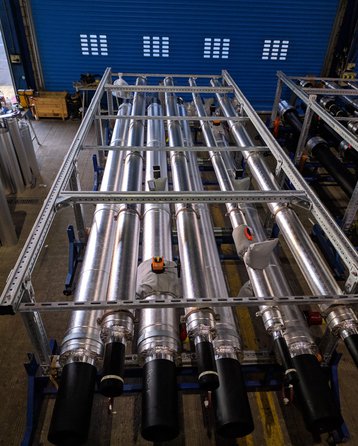In Japan, to be a master of one's profession is referred to as 'shokunin,' and as with many Japanese words, it has several layers of meaning.
Those who qualify have perfectly honed technical expertise in their craft and an underlying social consciousness. Shokunin is geared toward striving for innovation, to ultimately create the very best of something to the highest possible standard.
Founded in 1802, Georg Fischer is a global example of the shokunin spirit. Initially specializing in malleable iron fittings (which is still a present-day service), over the years, GF has continued to innovate, expanding its horizons to evolve alongside the world around it.
For the last 50 years, its division GF Piping Systems has developed offerings with a renewed focus on thermoplastic piping systems to combat new challenges and environments while supporting its customers throughout their projects. GF Piping Systems is committed to delivering full, turnkey solutions from engineering calculations during the design phase to the proper installation of its products and prefabricated components on the project site.
With customers in core markets consisting of gas and water utilities, water treatment plants, chemical process industries, and, more recently, the marine and microelectronics market segments, GF Piping Systems is already solving problems that made the next logical step into the data center industry an obvious evolution.
"Our involvement in the microelectronics sector has many synergies with the data center industry and has led us to be so heavily involved in this market today," explains Mark Bulmer, head of data centers global market development at GF Piping Systems.
This synergy stems from GF Piping Systems' mission-critical water management solutions that help the semiconductor manufacturers create the chips used in the world of data centers.
"At the moment, there aren't enough semiconductors to create the chips used in data centers, this is globally a big topic at present. We are the preferred quality supplier and EPIC award winner for the biggest semiconductor manufacturers globally and supply all the key players in the semiconductor space," says Bulmer.
GF Piping Systems works directly with factory operators to develop added value piping systems tailored to their applications and environments. For example, the company has created a specific system for ultra-pure water, the water required to manufacture wafers within the semiconductors that then produce the chips used in a data center explains Bulmer.
Thanks to this success, GF Piping Systems was approached by data center operators to provide 'cut and paste' solutions for facilities worldwide. To help improve operational efficiency and cost-effectiveness for factories and improve time to market – a key differentiator in a sector experiencing such rapid growth.
"The footprint of large hyperscale data centers doesn't differ too much the world over, and they do try to copy and paste. As a global company, we can offer the same quality of fabricated products to international users in every continent of the world.
"We've developed a specific solution for mission-critical facilities concerning completely non-corroding piping systems, based on recyclable thermoplastic materials that we can then support with engineering and off-site manufacturing."
A feat of (re)engineering
GF Piping Systems has re-engineered traditional, corrosive heavy metal piping systems and created the non-corrosive thermoplastics seen in its range today, helping general contractors and builders with a truly turnkey solution.
Thanks to its smoothness, non-corroding quality, and long lifespan, the new material helps ensure an operationally efficient system. Installation is faster and more cost-effective due to the material's low weight, welding plastics is far quicker than metals using computer controlled welding machines including bespoke welding protocols.
GF Piping Systems offers its customers in-house prefabrication support via its worldwide prefabrication locations. Piping systems can be bundled into frames or pipe modules, and size-depending, bespoke spools, all assembled and pre-pressure tested to drawing.
Moving as much work as possible from the site in question to a controlled factory environment improves quality on-site and reduces time but increases operational safety by minimizing the risk of on-site accidents and reducing on-site errors that can often have expensive consequences.
Damage limitation is further solidified by offering piping as a whole system rather than individualized products. The complete solution is 100 percent maintenance-free for 25 years, vapor-tight, and resistant to UV and inclement weather, reducing maintenance requirements, running costs, and ensuring reliable operation.
"It's all very well to produce good quality pipes or good quality valves, but if there is a weak link somewhere in the piping system, it falls apart. The best equipment needs the best complete compatible piping system!" says Bulmer.
When developing data centers, mission-critical environments that rely on mission-critical cooling must be handled as high-quality installations that demand engineered quality solutions.
"We utilize our highly engineered piping systems to govern the quality of the end-user installation. If you have to rely on third-party products, you could build weak links into the system. That's why we also offer not just a complete piping system, but the engineering behind it, because that needs to be done properly," says Bulmer.
Sustainable solutions
Plastic piping boasts a carbon dioxide balance that is 80% lower than its metal counterpart while also being fully recyclable. These credentials put GF Piping Systems in good sustainable stead, as over the last 18 months, the company has experienced a notable increase in operators asking for carbon footprint calculations.
"Almost daily, we receive requests to give calculations concerning sustainability in terms of embedded carbon in our product," says Bulmer.
And it's understandable. When it comes to sustainability, operators must be increasingly mindful of the amount of embedded carbon in their facilities. The whole data center lifecycle affects the overall carbon footprint of the products within it, as well as their recyclability of those products at the end of their lifespan.
Embedded carbon aside, thanks to advances in artificial intelligence (AI) and other developments within the so-called metaverse and gaming industries, what data centers need most right now is more efficient cooling.
"The speed and the performance required of chips in future data centers will rapidly increase. Consequently, the actual chips produce a lot more heat that has to be cooled more effectively," explains Bulmer.
When we talk about effective cooling for future technologies, the old ways of doing things will soon become obsolete. One example is water to air cooling, which encompasses classical chillers, and evaporative or adiabatic coolers, all of which use air handling units to cool the data center.
"At the moment, no one knows where the limit is in rack density. But as the rack densities go up from 20 to 100 kilowatts, air cooling will not be enough. There is a huge market trend in line with sustainability targets, but also because of the changes in processes and chip processing speeds."
Ultimately, we need to see a mechanical shift from air to liquid cooling. Over the last 12 months, GF Piping Systems has seen a marked increase in requests for these systems. "All of a sudden, liquid cooling systems sold as prototypes are becoming real facility solutions in immersion cooling and other cooling applications," says Bulmer.
And although a relatively new concept, end-users the likes of the US Department of Defence (DoD) have been in the know since 2012, integrating direct-to-chip (D2C) liquid cooling within its existing facilities to tackle increasing rack densities.
In 2018, tech-giant Google followed suit for the same reasons, with increasing power requirements driving the company to retrofit its data centers to support liquid cooling.
And where there is high power consumption, i.e. HPC applications, the advantages of integrating direct-to-chip liquid cooling are clear to see. Research carried out at a subarctic supercomputer center in Norway concluded that in that particular case, D2C liquid cooling could reduce total power consumption by up to 14.4 percent, depending on inlet air temperature.
This kind of D2C integration allows operators to branch off their standard water air cooling systems and use that water for their new direct chip cooling, avoiding a complete system overhaul.
GF Piping System's thermoplastic systems are 100 percent compatible with the waters and fluids used, including the dielectric fluid used in immersion cooling. Optimized for the needs of the liquid cooling loop, the non-corrosive plastic piping operates with a very high level of safety and cleanliness, creating the most secure and reliable system possible.
This security is further enhanced by creating prefabricated rack manifolds for horizontal laterals throughout the system, reducing the amount of jointing needed in the data hall. Combined with non-drip hose connections and quick disconnects, the potential for any leaks is eliminated, providing the end-user with the ultimate security and reliability.
And let's not forget that cooling is an expensive business, every kw of power consumption for the servers needs a kw of cooling, and remember these facilities have power consumptions around 120 MW. GF Piping Systems solutions can help reduce cooling costs by up to 25 percent, thanks to the low thermal conductivity and smooth non-corroding bore of its factory-insulated pipes, valves, and fittings.
Moving with the times
Under normal circumstances, distributing liquid within the whitespace would not be logical. And despite the data center market desperately trying to avoid a fluid future, snowballing rack densities and increasingly complex processes now mean it is unavoidable.
The need for reliable, secure, sustainable solutions cannot be understated. This is why we need companies like GF Piping Systems – complete with shokunin spirit – to provide international end-users with much improved, affordable solutions that encompass products and the engineering expertise required to ensure success in both our digital present and digital future.
To find out more about GFPS footprint and data center solutions, please visit GF Piping’s Data Center Portal.
More from GF Piping Systems
-

Staying in front
Training is the key to staying abreast of developments in an industry as fast moving as the data center sector, says Georg Fischer’s Ian Waldock
-

Staying cool: How DCPro training has injected fresh confidence into Georg Fischer
Mirela Dumitrache is an industry veteran with 15+ years of experience. But data center technology moves fast and training is vital to keep up, she says
-

Three solutions to major cooling technology challenges
Global leaders guide us through their answers, from a re-balancing of CAPEX to OPEX, to the increased role of plastic and tech to alleviate water consumption concerns



